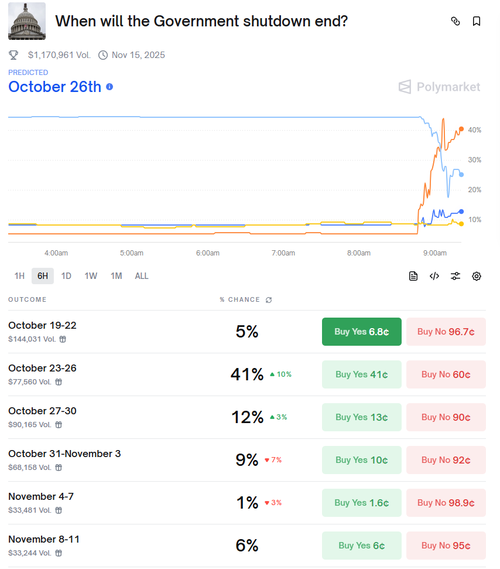With the government shutdown in its third week, White House’s top economic advisor Kevin Hassett said on Monday that the government shutdown is “likely to end sometime this week,” and that if it does not, the Trump administration may impose “stronger measures” to try and force Democrats to cooperate.
Hassett told CNBC that he’s heard from the Senate that Democrats thought it would be “bad optics” to vote to reopen the government before this weekend’s nationwide “No Kings” protest.
“Now there’s a shot that this week, things will come together, and very quickly,” he said. “The moderate Democrats will move forward and get us an open government, at which point we could negotiate whatever policies they want to negotiate with regular order.”
“I think the Schumer shutdown is likely to end sometime this week,” he said, referring to Senate Minority Leader Chuck Schumer (D-NY), who Republicans have blamed for letting the government shut down.
If it doesn’t reopen, “I think that the White House is going to have to look very closely, along with [White House budget chief Russell] Vought, at stronger measures that we could take to bring them to the table,” Hassett continued – suggesting that Democrats are simply looking for a politically opportune time to fold.
Watch:
HASSETT: There’s cracks in the Schumer armor. I think the Schumer Shutdown is likely to end sometime this week. But I can tell you that if it doesn’t… the White House is gonna have to look very closely… at stronger measures that we can take to bring them to the table. pic.twitter.com/Z13tK3nyfd
— Rapid Response 47 (@RapidResponse47) October 20, 2025
Hassett’s comments added to the market’s Monday morning momentum, and sent Polymarket betters into a frenzy as to when the shutdown will end.
Hassett’s comments aside, the shutdown is currently in day 20 – with no obvious end in sight.
The top issue is Affordable Care Act subsidies – which Democrats are demanding an extension of a Biden-era pandemic ACA expansion set to expire at the end of the year – arguing that failing to do so would increase healthcare costs for families.
That said, maintaining the tax credit carries a big price tag – as permanently expanding the most generous benefits would increase the deficit by $350 billion from 2026 – 2035, according to the Congressional Budget Office.
Lawmakers don’t have much time, however, as around a dozen states have published ACA heal insurance prices for 2026 which show many premiums skyrocketing unless Congress extends. By next week, dozens of other states will reveal pricing for next year.
Loading recommendations…


















